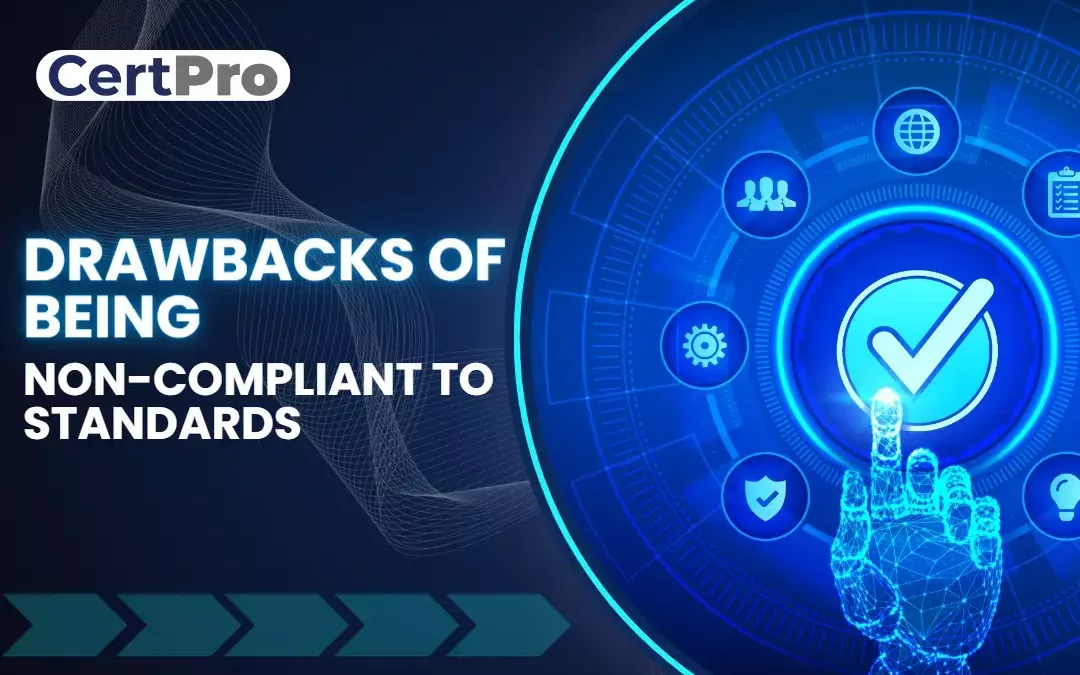Non-compliance occurs when an organization doesn’t keep up with the rules and regulations of the standards. The complications of non-compliance are very perilous. Consequences of noncompliance include prison time, property damage, lost productivity, worker injuries and deaths, and property damages. The company risks losing everything it has built over the years, as clients do not trust a company that lacks credibility, which also results in substantial financial penalties.
Today, risks are everywhere, and many of us wanted to get rid of them but never did anything to get rid of them. We don’t desire to stay compliant, but it is necessary for us. So, Being compliant improves efficiency and helps businesses stay protected.
This article is focused on presenting a thorough examination of compliance, emphasizing the relevance of maintaining laws and regulations, and exploring the serious consequences that occur when businesses fail to uphold compliance standards.
WHAT IS COMPLIANCE?
Compliance refers to the act of following a set of rules, regulations, or guidelines that are related to specific standards for particular companies. It ensures that every individual in the company, organization, or system operates in accordance with the established rules and requirements set forth by governing bodies. Compliance applies to various areas such as finance, health care, data security, environmental regulations, worker laws, etc.
Maintaining compliance is a process involving the implementation of policies, procedures, and controls that ensure that activities are conducted legally and ethically. Compliance efforts typically involve activities such as risk assessment, internal audits, documentation, training, etc.
Compliance in the financial sector promotes accurate financial reporting, prevents fraud, and maintains transaction transparency. Compliance is essential in the healthcare sector to protect patient privacy, uphold the standard of care, and comply with industry-specific rules like HIPAA (Health Insurance Portability and Accountability Act). Protecting sensitive information, preventing unwanted access, and following data protection rules like the GDPR (General Data Protection Regulation) or CCPA (California Consumer Privacy Act) are all covered by data security compliance methods. Following environmental laws and rules, lessening negative effects on the environment, and supporting sustainable behaviors are the main goals of environmental compliance.
IMPACT OF BEING NON-COMPLIANCE
Compliance, in its broadest sense, refers to all of the laws, rules, and procedures that a business must uphold. In essence, compliance helps businesses conduct themselves ethically and conform to legal, financial, operational, and accounting requirements. Non-compliance happens when a person or organization disregards certain industry norms. And as a result, organizations endanger themselves and others. Therefore, they need to be flexible and keep up with the evolving requirements. Otherwise, non-compliance might have devastating effects for the organization.
Non-compliance can range in severity. It might be a small mistake, something accidentally missed, or something with a critical effect that jeopardizes the future of the company. Minor non-compliance is accepted temporarily or sometimes. However, persistent non-compliance might result in a more serious issue. You should be informed of the laws that apply to your industry because regulatory requirements vary based on the industrial sector in which you operate.
RISKS OF NON COMPLIANCE
The risks associated with non-compliance are numerous and can have far-reaching implications for organizations. The effects of non-compliance vary depending on the type of business. Some laws and guidelines only apply to businesses in a specific sector, while others are applicable to all businesses. Threats from fraud, corruption, and conflicts of interest are prevalent in almost all industries. The consequences that the company will experience directly depend on the nature and extent of non-compliance. Among the most typical results are:
1. Penalties and fines: Financial fines, restrictions on operations, higher approval hurdles, and even imprisonment are all examples of penalties and fines for non-compliance. The regulatory authorities may apply harsh penalties and fines as a result of non compliance. Additionally, non-compliant firms risk having their licenses withdrawn or suspended, which would put a stop to their activities until compliance was attained.
When a company is proven to be breaking the law, the public’s trust and confidence may be damaged. On an organization’s reputation and market image, negative publicity, a loss of consumer trust, and a drop in commercial chances may leave a lasting impression. This can also result in operational inefficiencies and interruptions. Organizations may be subject to compliance orders from regulatory agencies that demand that they adopt particular remedial measures.
2. Reputational damage: Reputational damage can manifest in various ways. First and foremost, it may result in a decline in client loyalty and trust. Customers and consumers may doubt an organization’s honesty and dependability if they believe it to be non-compliant. This breakdown in trust may lead to lower client retention rates, lower sales, and even serious financial harm to the company. It can also attract negative media attention and public scrutiny.
Pepsi was involved in a significant uproar in 2017 for an advertisement with Kendall Jenner that was highly criticized for demeaning the Black Lives Matter movement. The advertisement featured Kendall Jenner handing a Pepsi can to a police officer at a protest, implying that a straightforward beverage might address the many problems faced by activists. The advertising was pulled, and Pepsi issued an apology as a result of the campaign’s fast and widespread response from the public and activists.
According to critics, the advertisement not only oversimplified the gravity of social justice movements but also showed a lack of awareness and compassion for the struggles of oppressed people.
3. Market Access Problems and Item Delays: Market access may be delayed or even denied due to non-compliance with trade restrictions, such as import/export legislation, customs processes, or product certifications. Products could be rejected, inspected, or even recalled if they fail to meet safety, environmental, or quality requirements. These delays can mess up manufacturing schedules, mess up supply networks, and mess up consumer pleasure.
Businesses must emphasize compliance with applicable laws and standards in order to reduce these risks. To guarantee continued adherence, this calls for doing in-depth research, putting in place reliable compliance management systems, and routinely evaluating and upgrading procedures.
4. Enterprises that are not regulated: The regulatory authorities may take measures to enforce compliance or impose fines that might ultimately result in the closure of the firm when a company repeatedly fails to comply with the relevant regulatory standards.
Regulatory agencies have the authority to cancel any licenses, permits, or certifications necessary for legitimately functioning in particular industries. These crucial authorizations may be suspended or revoked if a corporation consistently flouts the law or fails to resolve compliance concerns. Without the required licenses, the business might not be able to carry out its activities, which would prevent it from making money or providing customer service.

PREVENTION OF NON- COMPLIANCE WITH THE HELP OF CERTPRO
Prevention is key when it comes to avoiding non-compliance issues. CertPro emerges as a useful tool that aids businesses in navigating the difficulties of compliance and reducing the dangers related to non-compliance. With its extensive compliance management system, CertPro provides businesses with an organized method for locating, evaluating, and addressing compliance issues. CertPro simplifies compliance operations by utilizing cutting-edge technology and automation, enabling businesses to quickly track and monitor their compliance status with a variety of laws and standards.
FAQ
What are the repercussions of not complying?
Serious repercussions from non-compliance can include fines, harm to one’s reputation, lost business chances, financial losses, and even regulatory involvement or shutdowns.
What does it mean to be non-standards compliant?
Being out of compliance with standards refers to when a person or organization doesn’t fulfill the requirements stated in the standards. It might entail disregarding technological requirements, safety laws, moral principles, or standard operating procedures.
What possible legal repercussions may result from disregarding standards?
Legal repercussions, including fines, penalties, and legal action, may result from noncompliance with requirements. If businesses or people don’t fulfill the criteria, regulatory authorities may take enforcement action against them.
Do standard violations have financial repercussions?
Yes, there can be financial consequences for non-compliance. Organizations may spend more money to address non-compliance problems, such as redesigning goods, revamping workflows, or putting in place new protocols.
Does non-compliance put employee safety at risk in any way?
Employee safety may be put at risk due to noncompliance. Standards frequently incorporate safety standards and directives to shield workers from risks at work. A breach of these rules may lead to mishaps, injuries, or other health and safety problems.

About the Author
NICOLENE KRUGER
Nicolene Kruger, Regional Manager in South Africa, is an experienced Legal Counsel with expertise in compliance and auditing. Her strategic, solution-driven approach aligns legal standards with business objectives, ensuring seamless adherence to regulations.
HOW DO GRC TOOLS HELP IDENTIFY AND MITIGATE RISKS?
In today’s fast-paced business environment, emerging threats and risks negatively influence business operations. Threats can arise from different sources, such as cybersecurity compliance requirements, supply chain disruption, and natural disasters. Thus, the...
AI SECURITY: UNDERSTANDING THREATS AND COMPLIANCE SOLUTIONS
Artificial Intelligence continues to grow and become more relevant in workplaces. Customers widely use it to handle market products. Organizations are desperately using AI for their businesses, ensuring that the AI systems comply with the new rules and regulations. In...
HOW DOES THE NIST CYBERSECURITY FRAMEWORK FUNCTION, AND WHY IS IT IMPORTANT?
Emerging cyber threats make cybersecurity an essential consideration for organizations handling and managing data. In this regard, the NIST cybersecurity framework applies to improving your cybersecurity program. It is a set of guidelines that helps improve your...




